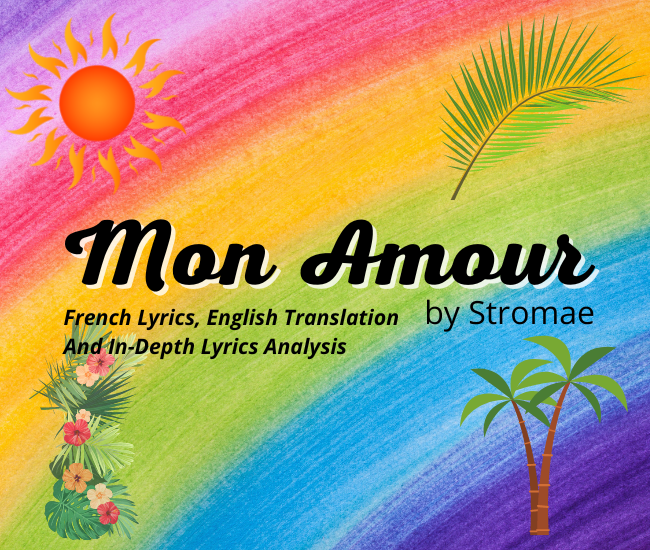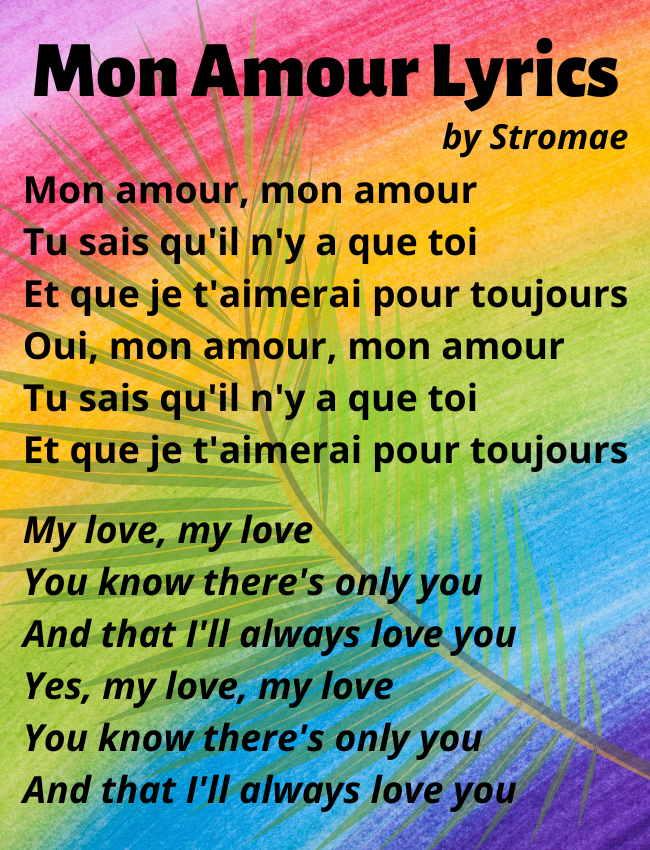“Mon Amour” (Meaning: My Love; Pronunciation: mɔ̃-n-amuʀ) is hit song released by Belgian singer Stromae on his 2022 album, Multitude. Singing with Latina singer Camila Cabello, “Mon Amour” is a spoof of the reality TV show, Love Island.

Stromae – Mon Amour song synopisis
The music video (see end of post) follows a fictional cast of characters in a French-language recreation of the Love Island. The main character in the video is a good looking guy named Quentin who is apparently a playboy. In the video, Stromae and Camila Cabello play the roles of show contestants. Stromae’s character uses special costume effects to make him appear to be “buff”.
The video starts with the show contestants enjoying their tropical paradise home. Then, by the end of the video everything becomes chaos filled with romantic drama and and supernatural special effects.
Following the course of the lyrics, Quentin goes down the list of girls he’s been with. (Y a d’abord eu Natasha, Mais avant y avait Nathalie; First there was Natasha, But before there was Nathalie).
By the end of the song Quentin is pleading and saying that he’ll never cheat again (Mon amour, oui, c’est promis, Oui, c’était la dernière fois; My love, I promise, It was the last time), and asking what’s so great about “the other guy” (Mais qu’est-ce qu’il a de plus que moi? But what does he have more than me?).

Mon amour lyrics analysis
In the following section we have gone through the entire song line-by-line explaining both vocabulary and grammar of interest.
Song title analysis
The title of the song and the first line of the chorus is “Mon amour, mon amour”, which translates to “my love, my love”. While the word “amour“ is a masculine noun, it can be used for a male of female individual.
In the case of this song it’s for female. In this context, “mon amour” can translates to “my dear”, “my darling”, “my love” or “sweetheart”. This page offers a longer list of French terms of endearment.
Y a d’abord eu Natasha, Mais avant y avait Nathalie
These lines translate to “First there was Natasha, But before there was Nathalie”. “Y a” is a shortening of “Il y a“, which means “there is”, “there are” and “ago”. “Il y a eu” is the past tense or “passé composé“ of “Il y a”, meaning “there was”.
“Y avait” is a shortening of “Il y avait”, which is the imperfect tense of “Il y a”. This also means “there was”. The imperfect tense is used for describing past events while the passé composé is used for mentioning specific events.
When telling stories, “d’abord“ means “firstly” and “avant“ means “before”.
Puis tout de suite après y a eu Laura, Et ensuite y a eu Aurélie
This line translates to “Then right after that there was Laura, And then there was Aurelie”. Again, when telling stories, “puis” means “then”, “après“ means “after” and “ensuite“ means “and then”.
Évidemment y a eu Emma
This line translates to “Of course there was Emma”. “Évidemment“ translates to “obviously”, “clearly”, “of course” and “needless to say”.
Mon Emmanuelle et ma Sophie
This line translates to “My Emmanuelle and my Sophie”. Both “mon” and “ma” are examples of possessive adjectives, meaning “my” in French.
Et bien sûr y a eu Eva, et Valérie, Mais
These lines translate to “And of course there was Eva and Valerie, But”. “Et“ means “and” in French. The -t is never pronounced. “Bien sûr“ means of course and “mais“ means “but”.
Tu sais qu’il n’y a que toi
This line translates to “You know there’s only you”. “Tu” means “you”. In French there are two ways of saying “you” in French: “tu” for people you know and “vous” for more formal situations and “you” plural.
“Sais” is the second-person singular (tu) form of “savoir”, which means “to know”. There are two says to say “to know” in French: “savoir” and “connaitre”. “Savoir” is used for facts and “connaître” is used for people, among other uses.
“Il n’y a que” means “there is only” or “there only is”. The structure “ne…que” is an advanced negation rule which means “only” in French.
“Toi” is a stressed pronoun, meaning “you” in French. Stressed pronouns (also called disjunctive pronouns) are often preceded by prepositions. For example, “avec toi” means “with you”.
Et que je t’aimerai pour toujours
This line translates to “And that I’ll always love you”. The word “que“ has many uses in French, one of which is to express “that”.
In French, “Je t’aime” means “I love you”. this comes from the verb “aimer”, which means “to like” and “to love”. In this line, “aimer” is being conjugated in the future tense.
The word “pour“ means “for” and “toujours“ means both “always” in “still”. When combined, “pour toujours“ means “forever” or “for always”.
Oui, mon amour, mon amour
This line translates to “Yes, my love, my love”. “Oui” means “yes” in French.
Mon amour, oui, c’est promis
This line translates to “My live, yes, it’s promised”. “Promis“ is the adjective for the related word “promised” in French and comes from the verb “promettre“ (to promise).
Oui, c’était la dernière fois
This line translates to “Yes, it was the last time”. “C’était” means “it was”. This is the verb “être” (to be) conjugated in the imperfect tense. “Dernier/dernière“ means “last” in French.
There are two ways to say “time” in French: “fois” and “temps”. “Fois” is used in the context of “how many times” and “temps” is used to describe “time” in general. The word “temps” also means “weather” in French.
Et j’te promets que je t’ai tout dit
This line translates to “And I promise you that I told you everything”. The “te” in this line can translate to “you”, “to you” or “at you”.
The word “tout“ has several usages in French, one of which is to express “everything” .
Plus rien tu ne découvriras
This line translates to “You don’t discover anything else”. “Plus” means “more”. When used in the context of a negation, it means “anymore”. “Rien“ translates to “nothing” and “anything”. When combined, “plus rien” can translate to “anything else”.
Plus aucune autre fille dans notre lit
This line translates to “No (more) other girl in our bed”. The word “aucun(e)”, means “any”. It must agree with the gender of the noun it precedes. Hence, “aucune fille” means “any girl”.
The preposition “dans“ means “in”. More specifically, it means “inside of”. Another way to say “in” in French is “en“. This page examines “en vs. dans“.
Elles m’ont mis dans de beaux draps
This line translates to “They put me in beautiful sheets”. “Elles” means “they” in the context of a group formed entirely by females. “They” in French is “ils” when describing a group of men and women together. This page explores French subject pronouns.
“Beaux” means “beautiful” in the masculine-plural form. The word “drap“ means “sheet” in French. “Mis” is the past participle of the verb “mettre” (to put).
Oui, bien sûr, j’ai choisi, Mais pas celles-là
These lines translate to “Yes, of course I chose, But not those”. “J’ai choisi” is the passe compose of the regular IR verb “choisir“ (to choose). “Celles-là” is a demonstrative pronoun in the feminine-plural form literally translating to “those ones there”.
Non, c’est pas c’que tu crois
This line translates to “No, it’s not what you think”. The line is a shorting of “ce n’est pas ce que tu crois”. In French negation in conversation, the “ne” in the “ne…pas” construction is often omitted.
“Ce que” is an indefinite relative pronoun, meaning “what”. “Crois” is the second-person singular (tu) form of the verb “croire“ (to believe).
Je sais, ça paraît bizarre
This line translates to “I know, it seems weird”. The word “ça“ means “that”, “this” or “it” in French and is used to refer back to a previously mentioned subject. “Paraît” is the third-person singular form of the verb “paraître“, which means “to appear” , “to seem” or “to look”.
Non, c’est pas ma faute à moi
This line translates to “No, it’s not my fault”. “Non” means “no” in French. “Faute” can translate to “mistake” and is related to the English word “fault”. “À moi” translates literally to “to me” and is used to put emphasis on expressing “my”. Camille at Frenchtoday.com’s renowned audio French course is called, “À Moi Paris“ (my Paris).
Mais sans doute la faute au hasard
This line translates to “But no doubt some random fault”. The expression “au hasard“ translates to “at random” or “randomly”. The preposition “sans” means “without”.
Pourquoi tu t’en vas? C’était la dernière fois
This line translates to “Why are you leaving? It was the last time”. “Pourquoi“ means “why” in French. In slightly more formal French, the question should have been asked, “Pourquoi est-ce que tu t’en vas?”. “Est-ce que“ means is/are/do/does for yes-know questions.
“Tu t’en vas” is the reflexive verb “s’en aller” (to go, leave, be on your way), conjugated in the second-person singular (tu) form.
C’était juste un coup d’un soir, ça comptait pas
This line translates to “It was just a one-night stand. It didn’t count”. “Coup d’un soir” translates literally to “a hit of a night” and means “one-night stand”. The verb “compter“ means “to count”.
T’façon, j’sais qu’au fond d’toi tu les aimes bien, les connards
This line translates to “Anyway, I know that deep down inside you really like the jerks”. “T’façon” is shortening of the expression “de toute façon“, meaning “anyway” or “anyhow”.
The word “fond” means “bottom” and “au fond de” means “deep down inside”. The slang word “connard“ can translate to “jerk”, among other translations.
Depuis que t’es partie, la vie n’a plus la même saveur
This line translates to “Since you left, live hasn’t been the same appeal”. “Depuis” means “since” in French. “Tu es partie” means “you left”. “Partir” (to leave) uses “être” (to be) as its auxiliary verb in the passé composé.
The word “même“ has several translation including “same”. “Saveur“ has multiple translations including “flavor”, “taste” and “appeal”.
Les draps n’ont plus la même odeur, Depuis que j’fais la lessive
These lines translates to “The sheets don’t have the same smell anymore, Since I did the wash”. The word “odeur“ in French means “smell” and doesn’t necessarily have the same negative connotation as the English word “odor”. The expression “faire la lessive” means “to do the wash”. The verb “faire“ means “to make” and “to do”.
Mais qu’est-ce qu’il a de plus que moi?
This line translates to “But what does he have more than me?”. When “est-ce que” is preceded by “que”, it translates to “what”. “Il a” means “he has” and is the third-person singular form of “avoir” (to have).
Est-ce qu’il en a une plus grosse que moi?
This line translates to “Does he have a bigger one than me?”. The expression “en avoir une” means “to have one of them”. In French, there are two adjectives for big: “grand” and “gros”, the later of which is used for sizes of objects.
Vous l’faites combien d’fois par mois?
This line translates to “How many times per month do you do it?”. “Vous l’faites” is a shortening of “vous le faites”, meaning “you do it”. In this sentence, “le” is a direct object pronoun meaning “it”. “Le” is also a direct article, meaning “the”. The expression, “combien de + noun” means “how many”.
Et puis mes slips sont dans quelle armoire?
This line translates to “Et puis mes slips sont dans quelle armoire?”. “Slip” in French refers to a man’s underwear. “Quel“ is an interrogative adjective meaning “what” or “which”.
La vie est si injuste
This line translates to “Life is so unfair”. “Si“ means “if”, “so” and “yes”. “Juste” means “fair” and “injuste” means “unfair”.
Dis-moi, dis-moi
This line means “Tell me, tell me”. “Dis” is the imperative (tense used for commands) of the verb “dire” (to say, to tell).
Ce que j’ai fait au juste
This line translates to “What I did exactly”. The expression “au juste“ means “exactly” or “precisely”.

Stromae Mon Amour- French Lyrics, English Translation
Y a d’abord eu Natasha
Mais avant y avait Nathalie
Puis tout de suite après y a eu Laura
Et ensuite y a eu Aurélie
Évidemment y a eu Emma
Mon Emmanuelle et ma Sophie
Et bien sûr y a eu Eva, et Valérie
Mais
First there was Natasha
But before there was Nathalie
Then right after that there was Laura
And then there was Aurelie
Of course there was Emma
My Emmanuelle and my Sophie
And of course there was Eva and Valerie
But
Mon amour, mon amour
Tu sais qu’il n’y a que toi
Et que je t’aimerai pour toujours
Oui, mon amour, mon amour
Tu sais qu’il n’y a que toi
Et que je t’aimerai pour toujours
My love, my love
You know there’s only you
And that I’ll always love you
Yes, my love, my love
You know there’s only you
And that I’ll always love you
Mon amour, oui, c’est promis
Oui, c’était la dernière fois
Et j’te promets que je t’ai tout dit
Plus rien tu ne découvriras
Plus aucune autre fille dans notre lit
Elles m’ont mis dans de beaux draps
Oui, bien sûr, j’ai choisi
Mais pas celles-là
My live, yes, it’s promised
Yes, it was the last time
And I promise you that I told you everything
You don’t discover anything else
No (more) other girl in our bed
They put me in beautiful sheets
Yes, of course I chose
But not those
Mon amour, mon amour
Tu sais qu’il n’y a que toi
Et que je t’aimerai pour toujours (pour toujours)
My love, my love
You know there’s only you
And that I’ll always love you (always)
Non, c’est pas c’que tu crois
Je sais, ça paraît bizarre
Non, c’est pas ma faute à moi
Mais sans doute la faute au hasard
Pourquoi tu t’en vas? C’était la dernière fois
C’était juste un coup d’un soir, ça comptait pas
T’façon, j’sais qu’au fond d’toi tu les aimes bien, les connards
No, it’s not what you think
I know, it seems weird
No, it’s not my fault
But no doubt some random fault
Why are you leaving? It was the last time
It was just a one-night stand
Anyway, I know that deep down inside you really like the jerks
Mon amour, mon amour (oui, mon amour)
Tu sais qu’il n’y a que toi
Et que je t’aimerai pour toujours (oui, pour toujours)
My love, my love, (yes, my love)
You know there’s only you
And that I’ll always love you (yes, always)
Depuis que t’es partie, la vie n’a plus la même saveur
Les draps n’ont plus la même odeur
Depuis que j’fais la lessive
Mais qu’est-ce qu’il a de plus que moi?
Est-ce qu’il en a une plus grosse que moi?
Vous l’faites combien d’fois par mois?
Et puis mes slips sont dans quelle armoire?
Since you left, live hasn’t been the same appeal
The sheets don’t have the same smell anymore
Since I do the wash
But what does he have more than me?
Does he have a bigger one than me?
How many times per month do you do it?
And since my underwear are in which wardrobe?
Mon amour, mon amour
Tu sais qu’il n’y a que toi
Et que je t’aimerai pour toujours
Mon amour, mon amour
Tu sais qu’il n’y a que toi
Et que je t’aimerai pour toujours
My love, my love
You know there’s only you
And that I’ll always love you
My love, my love
You know there’s only you
And that I’ll always love you
Mais pourquoi? Pourquoi?
La vie est si injuste
Dis-moi, dis-moi
Ce qu’il a de plus
Que moi, dis-moi
Ce que j’ai fait au juste
Pourquoi? Pourquoi?
La vie est si injuste
But why? Why?
Life is so unfair
Tell me, tell me
What he has more
Than me, tell me
What I did exactly
Why? Why?
Life is so unfaire
Dis-moi, dis-moi
Ce qu’il a de plus
Que moi, dis-moi
Ce que j’ai fait au juste
Pourquoi? Pourquoi?
La vie est si injuste
Tell me, tell me
What he has
More than me, tell me
What I did exactly
Why? Why?
Live is so unfair
Listen to Mon Amour
The official video for Mon Amour has over six million views.
You can also listen on Spotify:
Become an expert in French song lyrics
One of the most effective ways to learn French is to use song lyrics. For Stromae, we’ve analyzed the lyrics of the following songs: “L’enfer“, “Alors On Danse“, “Formidable“, “Papaoutai” and “Tous Les Mêmes“. Indila is a leading French female singer. For Indila, we’ve analyzed the lyrics of the following sings: “Love Story“, “Tourner Dans Le Vide“, “Dernière Danse” and “Ainsi Bas La Vida“. We analyzed the lyrics of many other classic French songs including “La Vie En Rose” and “Non, Je Ne Regrette Rien” (by Edith Piaf), “C’est Si Bon” (by Yves Montand), “Ne Me Quitte Pas” (by Jacques Brel), “Les Champs-Elysees” (by Joe Dassin) and “La Bohème” (by Charles Aznavour).
